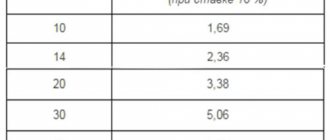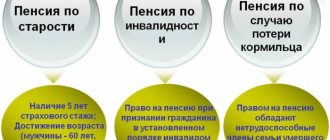General provisions of the Federal Law (FL)
This law came into force at the end of 2001, and from that moment it has been in force to the present day, subject to some amendments and changes.
The main essence of Article 167 of the law on pension insurance is to establish and regulate the principles of compulsory pension insurance, as well as legal relations between insurance participants. It also establishes certain rights, obligations of these parties and their responsibilities.
The very type of this insurance represents a certain system of government measures that will help compensate citizens for their earnings in certain situations. In order to organize this system, citizens must be insured without fail and pay certain insurance premiums, from which a budget will be formed to compensate the income of disabled citizens.
The responsible institution for monitoring and organizing payments, as well as collecting contributions, is the Pension Fund. All funds are on its balance sheet and are paid to citizens from its budget. The procedure for organizing the collection of insurance premiums is regulated by Tax legislation.
Under insurance coverage, Article 3 of this law means the fulfillment by the insurer (PFR) of its obligations to insured citizens upon the occurrence of established insured events.
The PFR budget is formed not only from contributions from insured participants. Transfers are also made from the state budget. To determine the required amounts to be transferred to the Pension Fund, the cost of the insurance year is calculated. This is a certain amount of funds, which is calculated by the government of the Russian Federation annually based on the minimum wage, which is established at the beginning of the year, multiplied by the insurance tariff, which is also established by the government. And the resulting amount is multiplied by 12 months.
Thus, the Pension Fund must receive this amount this year from all participants in the insurance system, including from the state.
Citizens' insurance premiums are divided into 2 parts:
- solidary;
- individual.
The first part creates a budget for mandatory fixed amounts of compensation to citizens. And the second part is intended for the formation of savings in individual personal accounts of citizens, which in the future will form the total amount of payments for each person.
The procedure and control over the organization of compulsory insurance is entrusted to state federal bodies.
Sources of pension insurance
The sources of financing of the Pension Fund are as follows:
- employers' insurance payments;
- insurance payments for Russians who are self-employed;
- insurance payments for other groups of employed Russians;
- transfers from the Russian treasury for the provision of pensions to army personnel, their relatives and people equal to them;
- money that is reimbursed to the Pension Fund by the State Employment Fund of Russia due to the registration of early pension provision for unemployed citizens;
- payments made voluntarily by legal entities and individuals;
- profit from the work of the Pension Fund.
Pension Fund money is used to:
- pay labor pensions, including to Russians who travel abroad;
- compensate lost income to citizens who care for disabled persons;
- increase pension provision for persons who participated in the Great Patriotic War;
- provide payments to caregivers;
- provide financial support to old and disabled people;
- provide funeral benefits;
- finance the work of the Pension Fund and its institutions.
Participants in legal relations
Article 4 of this law defines 3 types of pension insurance participants. These include:
- policyholders;
- insurers;
- insured persons.
The insurer is a government agency, with all its branches throughout Russia. This is the Pension Fund. And the state bears subsidiary liability for its obligations. The activities of the Pension Fund are regulated by this law.
Insurers also include non-state pension funds, which act as accumulators of insurance premiums for individual deposits of citizens. And also in the future they are obliged to make payments when insured events occur.
Policyholders are those persons who make insurance contributions for the insured persons. These may include:
- natural citizens;
- individual entrepreneurs;
- organizations;
- people engaged in private practice (notaries, lawyers).
If a citizen belongs to several categories at the same time, then he must pay insurance premiums for each category.
The insured persons are directly those citizens who will receive income compensation in established cases of disability. These may include Russian citizens, as well as other persons, regardless of their citizenship, staying in Russia legally.
These also include the following persons:
- employed persons;
- persons working under civil contracts;
- authors;
- individual entrepreneurs and citizens engaged in private practice;
- members of peasant farmers;
- clergy;
- persons working outside the Russian Federation, but making regular contributions to the Pension Fund;
- peoples of the Far North;
- some other persons established by law.
These categories of people are insured against the occurrence of an insurance risk. Which means loss of earnings or other income in certain cases. Insured events are the following circumstances:
- loss of a breadwinner;
- reaching the established retirement age;
- receiving disability.
If these circumstances occur, insured persons can count on the following insurance coverage:
- One-time payment of pension.
- Urgent payment of pension.
- Monthly receipt of the funded part of the pension.
- Insurance pension for old age, disability or loss of a breadwinner.
- Fixed payment to the insurance part of the pension.
- Funeral benefit for a deceased pensioner.
- Payment of pension savings to the legal successors of a deceased pensioner.
All these payments are made at the expense of the Pension Fund, as well as other non-state pension funds. To maintain records of policyholders, the Pension Fund of the Russian Federation registers and deregisters them on the basis of Article 11 of this law.
The following insurers are subject to mandatory registration:
- All employers.
- Anyone in private practice.
- Organizations that have bank accounts to issue certain payments and rewards to citizens.
After registration of the policyholder, he is issued a corresponding document. After deregistration, this document is returned. And all changes regarding the introduction of new information into the accounting system are reflected on the general Internet.
Calculation of the insurance part of the pension
The formula used in the final calculation of insurance premiums is simple. It consists of three indicators:
RP = IPK x SPK, where:
- RP – final amount of compensation;
- IPC - individual pensioner coefficient;
- SPK is the price of this coefficient at the time of assignment of pension payments.
A pensioner may decide that there are no difficulties, however, the multipliers of the formula - IPC and SPK - depend on several factors, the IPC is calculated individually, being directly dependent on the size of contributions to the individual account, and the number of years worked. The SPK changes every year, depending on the level of inflation and changes in the legislative framework, so a specific calculation is difficult for an unprepared person.
- Keratosis of the skin - causes, symptoms and treatment with medications and folk remedies
- Treatment of intracranial pressure in adults with drugs and folk remedies
- Tea for weight loss in pharmacies - which is better. Review of the most effective herbal and green teas for weight loss
The value of the IPK in 2021
The factor determining the final amount of compensation is the IPC. The calculation of the coefficient is complex; the formula takes into account data on monthly income before and after 2015, allowing citizens to retain their rights under previously adopted laws establishing pension supplements. The general formula looks like this:
IPC = KSP x (IPK₁ + IPC₂), where:
- KSP is an incentive increasing indicator used to calculate pension benefits for people who retire later than the established deadlines. When going on vacation with a year delay, the total IPC increases by 7%, with an eight-year delay - by 90%.
- IPC₁ is an individual coefficient applied until January 1, 2015.
- IPC₂ is an individual indicator used after January 1, 2015.
Fixed payment
As an analogue of the basic benefit, a fixed payment to the insurance pension in 2021 is assigned simultaneously with it. The amount of the surcharge is determined by the state, amounting to 4823 rubles 37 kopecks in 2021. Federal legislation establishes:
- Persons who have reached the age of 80, orphans, people with dependents, as well as those who have lived in the Far North for 15-20 years, and in rural areas for 30 years, may qualify for an increased amount of additional payment.
- For disabled people of group 3 and those applying for benefits for the loss of a breadwinner, 50% of the fixed benefit is established.
- If a person has the right to receive compensation upon reaching age, but refuses it, then it is indexed by an increasing factor.
- The surcharge is subject to annual indexation and may increase as PFR reserves increase.
Rights and obligations of subjects
As in any insurance relationship, each participant has its own rights and responsibilities. According to Article 13 of this law, the insurer has the right:
- Check documents from policyholders to verify the accuracy of calculations made regarding the amount of insurance premiums.
- Require insurers to eliminate violations identified during the inspection.
- Request and receive information from tax authorities about the income of insured persons.
- Manage funds in the budget of the Pension Fund and Non-State Pension Fund.
- Represent the interests of the insured persons and act in their interests.
- Exchange information with other government agencies.
- Refund paid insurance premiums to policyholders if it is impossible to determine for which insured person they were paid.
- Receive guarantee compensation from the Agency when investing pension savings.
This article also specifies the obligations of the insurer in relation to other participants in these legal relations:
- Control the information provided from policyholders.
- Provide a reasonable explanation of the established insurance premium rates.
- Assign and promptly pay due payments to insured persons.
- Monitor the list of documents that policyholders must submit to confirm the transmitted information.
- Draw up a draft budget for the Pension Fund of the Russian Federation and monitor its implementation throughout the year.
- Inform all participants in legal relations, as well as other interested government bodies, about your financial condition.
- Use funds only for their intended purpose and keep records of them.
- Carry out registration and deregistration of policyholders.
- Keep records of insurance premiums and maintain a state bank of policyholders.
- Ensure a regime for accumulating a special part of insurance premiums.
- Timely record income from investing funds from the special portion of contributions.
- Conduct free consultations for all participants in legal relations.
- Determine the amount of insurance premiums and keep records of them.
- Pay guarantee fees and provide information to the Agency about the number of insured persons, as well as the amount of their obligations to them.
The same article establishes the rights of policyholders:
- Participate in the implementation of pension insurance.
- Receive the necessary information from the Pension Fund for free.
- Protect your interests in court.
- Pay contributions to the funded part of the pension.
The obligations of the insured by law included the following:
- Register in the system in the prescribed manner.
- Pay pension insurance contributions in full and on time.
- Submit the necessary documents to the Pension Fund within the specified time frame.
- Comply with the requirements and instructions of the Pension Fund.
- Ensure the implementation of the rights of persons in whose favor the insurance is carried out.
The insured persons themselves also have certain rights and obligations. Rights include the following:
- The right to participate in this system of legal relations through policyholders and other representatives.
- Receive information from the Pension Fund and the employer about the contributions made.
- Receive the required insurance compensation in a timely manner and in full upon the occurrence of an insured event.
- Pay additional funds to form the funded part of the pension.
The obligations of these participants in insurance relations include the following:
- Provide the insurer and policyholder with all information affecting the formation and assignment of due payments.
- Follow the procedure for recalculation and assignment of payments.
- Provide reliable documents confirming the facts on the basis of which the insured person has the right to receive payment.
Thus, these rights and obligations of all participants in the insurance process organize the procedure for compulsory pension insurance.
Percentage deducted from wages in the Russian Pension Fund in 2018
In accordance with the requirements of Russian legislation, all employers were required to pay monthly payments for each hired employee to cover compulsory medical and pension insurance. It is on these revenues to the state budget that the possibility of issuing pensions to current pensioners, as well as to those who will acquire this status in the future, will depend.
Quite often, employees have a question about the amount of designated contributions deducted from their wages.
Before talking about the amount of deductions from wages allocated for pensions, it should be said that from January 1, 2021, the federal tax service began to collect debts. This decision is due to the fact that the Russian Pension Fund has ceased to cope with this task.
In 2021, when calculating wages from employees, an amount of 22% is withheld.
The employer is responsible for paying these contributions. The specified 22% consists of the insurance part, which accounts for 16%, and the savings part in the amount of the remaining 6%. The employee has the right to dispose of the remaining 6% independently by transferring it to a non-state pension fund, management company, or investing it.
Russian legislation provides some benefits for these deductions for some sectors of the economy, for example, companies in the information technology sector. In addition, the reduced rate applies if the employer has exceeded the limit on these contributions, then he has the right to claim a reduction in the established rate.
There is also the opposite practice, when an increased rate is applied to certain categories of employees. In this case, we are talking about those who are employed in production with hazardous working conditions or in hard work.
The funded part of contributions transferred to the Pension Fund is not indexed by the state. In 2012, it happened that the state froze this part of contributions for some time, since the Pension Fund did not have the proper resources and funds had to be allocated from the state budget and the National Welfare Fund.
Financial system
To fulfill pension insurance obligations, Article 16 of this law indicates the impossibility of withdrawing the PFR budget by other federal bodies. This budget is not included in other budgets and belongs entirely to the Pension Fund.
To form this budget, a certain standard of funds is established, which must be in the Pension Fund. This standard is established annually by the government of the Russian Federation.
The PFR budget makes a separate accounting of the funded part of the pension of insured persons in their personal accounts. The funds are in Bank of Russia accounts created for operations required by the Pension Fund.
Read how to check your pension savings here.
The budget is formed through the following:
- contributions from policyholders;
- funds from the federal budget;
- fines and penalties imposed on violators;
- income from temporary investment;
- voluntary contributions from citizens to accumulate pensions;
- reserve funds;
- other permitted sources of income.
The procedure for calculating and organizing interbudgetary transfers that form this budget is established by this law in Article 17. Spending funds from the budget is possible only for their intended purpose:
- Established payments to insured persons.
- Delivery of payments to your home and through intermediaries.
- Financial and material support for the activities of all branches of the Pension Fund.
- Payment of guarantee fees.
- Other permitted purposes.
All expenses must be planned in the draft budget for the next year and executed in accordance with this project. To ensure a financially stable pension system, the Pension Fund creates a certain reserve of funds that can be used under strictly defined circumstances. To calculate savings payments to insured persons, the individual pension coefficient is used. Read about the value of the IPC here.
Principles of OPS in Russia
The system operates based on certain principles. By following them, the state ensures its stability and efficiency:
- OPS is available to all Russians, regardless of their position in society;
- the state guarantees that the interests of all insured persons will be respected;
- the government constantly monitors how the OPS operates;
- employers are required to make regular payments for their own employees;
- the state is responsible for ensuring that the finances of the community security system are used rationally and for their intended purpose;
- OPS is subordinated to the interests of the government and citizens;
- OPS provides a decent standard of living for people who have retired due to old age;
- pension provision and total contributions are equivalent amounts;
- return of funds accumulated by a citizen in the OPS system;
- Insurance premiums are taken into account individually for each citizen.
Payment of insurance premiums
The amount of insurance premiums is determined on the basis of the tariffs established by the Pension Fund of Russia. Insured persons can choose whether they will contribute 6% of their contributions to the funded part of the pension. In addition, they will be able to independently choose a pension fund that forms the funded part of the pension. Find out when you can receive the savings portion in this article.
Of the 26% deducted, 10% is always allocated to the solidary part of the pension, from which payments are currently made to other insured persons. And the remaining 16%, a person can choose where they will be sent. You can send all 16% to the individual part of the pension, or leave 10% to the individual part and 6% to the funded part.
Contributions are calculated by sending a single payment document.
The Pension Fund of the Russian Federation allows the possibility of voluntary pension insurance for those who do not belong to the list of mandatory persons. The minimum amount of insurance premiums for them will be determined by their calculation of 2 minimum established levels of labor multiplied by the tariff and increased by 12 months. And the maximum contribution cannot exceed eight times the minimum wage.
Read about the disability insurance pension here.
How are contributions to OPS calculated?
For part of the population with formalized contractual relations, employers must pay contributions to the OPS. For 2021, the accepted levy rate is 22 percent of wages. The Pension Fund transfers the received money into coefficients. For those born before 1967, only the insurance part is formed, which means that the funded part can only be formed independently - through payments under the state co-financing program. It is also possible to replenish with maternity capital.
For individuals
Based on the conditions set out in Federal Law No. 56, future pensioners have the right to independently send payments to the funded part of their labor pension. With this option, no more than 20 days after the end of the reporting quarter, copies of payment orders with a mark of the financial organization that carried out the transaction should be sent to the local branch of the Fund. According to the provisions of the same Law, the submission of documents can be carried out through the organization where the payer works if it has an agreement on electronic document management with the Pension Fund of the Russian Federation.
For individual entrepreneurs and legal entities
Individual entrepreneurs without employees are nevertheless required to form their pension savings. Individual entrepreneurs pay a one-time fixed payment based on the results of the reporting period. This year its size is 32,448 rubles. with an annual income of no more than 300 thousand rubles. With greater income, an additional 1% is transferred to the Fund from the excess amount. Legal entities and individual entrepreneurs with employees are required to make transfers before the 15th day following the estimated date.
The amount of personal contributions of an entrepreneur is limited; for the current reporting period, the maximum is 259,584 rubles.
Final and transitional provisions
In the event of disputes between insurance participants, a written application must be submitted to the Pension Fund for consideration. If it is impossible to resolve the situation, participants can go to court. Liability is provided for violation of the obligations of each of the parties to these legal relations.
The insured person has the right to refuse to receive the payments due to him - the funded and insurance part of the pension.
For different insurers, a different taxation system may be provided, on the basis of which contributions to the Pension Fund will also be different. All tariffs are specified in detail in Article 33 of this law.
Based on this legislative act, signed by the President of Russia, a system of compulsory pension insurance operates in the Russian Federation. We recommend that you read about individual pension capital in this material.











